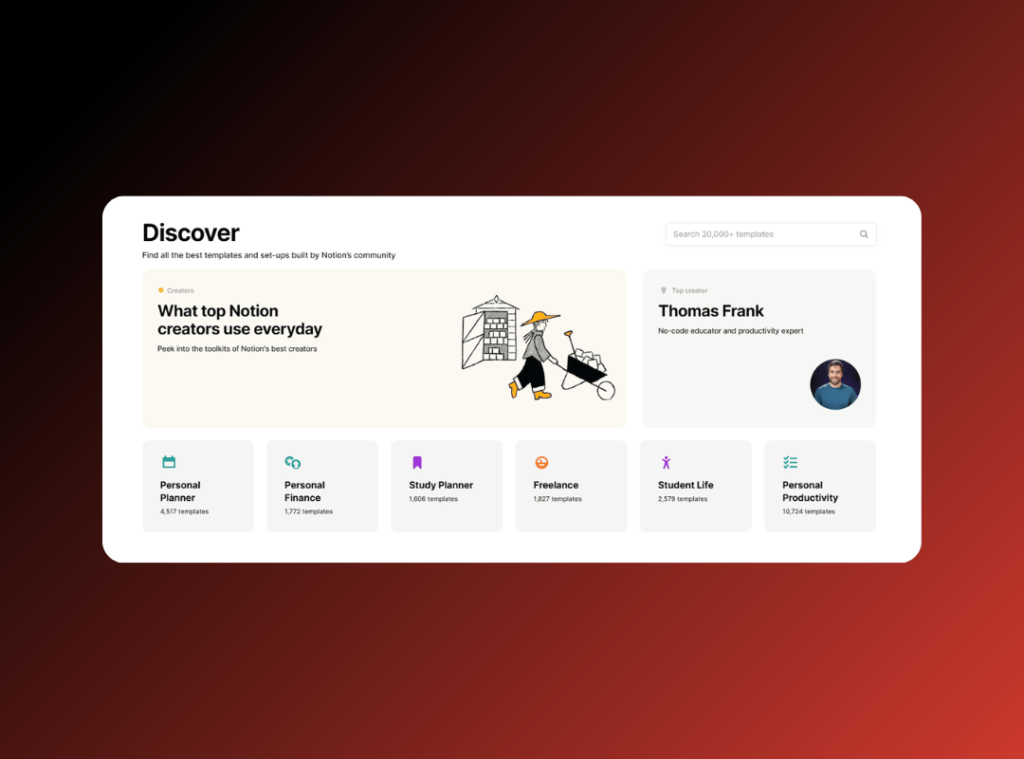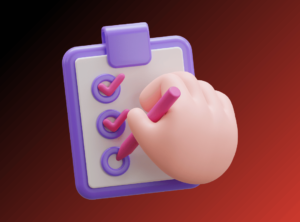Before venturing into selling Notion templates, it is essential to understand what they are and the advantages of offering them to the market. In this section, we will explore the meaning and functionality of Notion templates, as well as the reasons why marketing them can be beneficial for both sellers and buyers.

Table of Contents
ToggleWhat are Notion Templates?
Notion templates are pre-configured models that can be used to start projects, pages, or databases within the platform. They provide a basic structure that can be customized according to the user’s needs, saving time and boosting efficiency in workflow.
A complete guide to Notion templates typically includes examples for a variety of uses, such as project planning, task management, or content databases.
Advantages of Selling Notion Templates
Selling Notion templates offers several advantages.
For the seller, it represents an opportunity to monetize their expertise and knowledge of the platform, catering to a growing demand for customized solutions that enhance productivity.
For the buyer, acquiring an efficient template means having a tool that can streamline processes and organize information in a centralized manner.
Additionally, instructions and resources included in a template package can serve as a valuable tutorial to maximize the use of Notion. Consequently, the market for Notion templates is expanding, making it a promising area for successfully selling Notion templates.
Step-by-Step Guide to Selling Notion Templates
Selling Notion templates can be a good source of income, provided that a valuable product is created for the market with appropriate pricing.
Creating Attractive Templates
For a Notion template to be considered attractive, it must first address a specific need or simplify processes for users. The creation process begins with defining the target market and analyzing its pain points and desires.
For example, a project management template should provide a clear overview of tasks, deadlines, and responsibilities. It is essential that it is both functional and visually appealing, allowing for an intuitive and efficient user experience. Successful templates often have good structure and offer flexibility for customization.
To submit a template for sale, specific platforms for commercialization should be used or a personal website created for sales. It is important to establish an automated delivery process that may include sending download links as well as instructions for importing the template into the buyer’s Notion account.
How to Price Your Templates
The pricing of templates should reflect the value they offer while covering production costs and generating profit. It is advisable to conduct market research to understand the price range of similar templates. Another point is evaluating the complexity of the template and the time invested in its development. Setting the right price for your Notion templates is essential for covering production costs and generating profit. Here are key considerations to help you determine an appropriate price:
Complexity: The complexity of your template significantly influences its price. More intricate templates with advanced features can command higher prices, while simpler ones may be priced lower. Consider the number of features and the overall user experience.
Time spent: Factor in the total time invested in creating the template, including design, development, and testing. The more effort you put into it, the higher the price can be justified.
Differentiators: Identify what sets your template apart from others. Unique features, niche focus, or customization options can enhance its value and allow for a premium price.
Market prices: Conduct market research to understand how similar templates are priced. Analyze competitors and gather customer feedback to determine a suitable price range.
Promoting and Distributing Your Templates
When entering the Notion template market, success often depends on effective digital marketing strategies and choosing appropriate sales platforms. These two components are crucial for reaching and converting your target audience into customers.
Digital Marketing Strategies
Digital marketing is fundamental for promoting Notion templates. Entrepreneurs should focus on building a strong online presence by creating quality content that showcases and demonstrates the practicality of their templates.
Utilizing search engine optimization (SEO) to improve visibility on search engines can be a critical step in attracting relevant traffic. Reach can be expanded through paid campaigns on Google Ads and Facebook Ads, as well as engaging on social media where potential customers are already active.
Sales Platforms for Templates
Choosing the right platform to sell your Notion templates can define your reach and ease of distribution. Platforms like Creative Market and Gumroad are popular among template creators, offering ready-made payment and distribution systems. Additionally, specialized websites for digital productivity products may attract an audience more aligned with Notion templates, increasing sales conversion chances.
Preparing a sales strategy that encompasses appropriate digital marketing along with selecting a sales platform aligned with your target audience can make all the difference in your journey on how to sell Notion templates. Integrating these efforts will result in effective distribution and a solid customer base for your products.
How to Submit Templates to the Notion Gallery
Before starting the submission process, it is crucial to carefully read the guidelines and terms of the Notion template gallery. Interested parties must ensure that their template is a single page and set up for public viewing.
To enable public sharing, access the Share menu located at the top right corner of the template page and activate the Share on web option. It is also necessary to ensure that the Allow duplicate as template option is enabled.
Currently, Notion supports templates in the following languages: English, Korean, Japanese, French, German, Spanish (Spain), Spanish (Latin America), and Portuguese (Brazil).
By clicking on the submission link, users will be redirected to a form where they must provide:
- Contact information for future communication;
- The language of the submitted template;
- Whether the template will be offered for free or through a paid site;
- Details about the functionality of the template and usage instructions.
Legal Tips and Best Practices
When venturing into selling Notion templates, it is crucial to observe legal regulations and apply best market practices. This ensures not only copyright protection but also customer satisfaction—both fundamental aspects for sustainable business success.
Copyrights and Intellectual Property
It is imperative that creators of Notion templates have a solid understanding of copyrights and intellectual property. The design of a template should be original to avoid copyright infringements. In case of doubt, it is advisable to consult Notion itself to avoid having your account banned.
Key Points:
Ensure your template does not violate others’ copyrights
Before launching your template, take the time to verify that it does not infringe on anyone else’s copyrights. This involves:
- Original Content: Ensure that all elements of your template—such as text, images, icons, and design—are original or properly licensed. Avoid using copyrighted materials without permission.
- Inspiration vs. Copying: While it’s fine to draw inspiration from existing templates, make sure your design is unique. Directly copying another creator’s work can lead to legal issues and damage your reputation.
- Attribution: If you use third-party resources (like icons or images), provide proper attribution if required. This not only respects the original creator’s rights but also enhances your credibility.
Consider registering your template design for protection
To further safeguard your intellectual property, consider taking the following steps:
- Copyright Registration: While copyright protection is automatic upon creation, registering your design with the appropriate copyright office can provide additional legal benefits. This formal registration can strengthen your position in case of disputes.
- Trademarking: If your template includes a unique name or logo, consider trademarking it. This helps protect your brand identity and prevents others from using similar names or logos that could confuse customers.
- Licensing Agreements: If you plan to allow others to use or modify your templates, consider drafting licensing agreements that outline how they can be used. This helps clarify ownership and usage rights.
Customer Service and After-Sales Support
Customer service and after-sales support are extremely important measures when selling Notion templates. Sellers should provide clear guidance on how to use the template and resolve any issues that may arise.
Establish efficient communication channels:
- Email: Respond to inquiries and feedback.
- FAQ: Provide a frequently asked questions section that helps users in their daily use.
Maintaining an attentive and helpful approach in customer service builds trust relationships and can generate positive reviews that encourage new sales.
Frequently Asked Questions
When embarking on creating and selling Notion templates, several common questions may arise. This section aims to clarify frequent doubts from creation to monetization of your templates.
What are the steps to create a sellable Notion template?
To create a sellable Notion template, it’s essential to identify a market need and design a template that effectively addresses it. In addition to mastering Notion tools, time should also be invested in quality and aesthetics of the final product.
How can I promote my Notion templates to reach more customers?
Effective promotion can be done through social media, blogs, or even collaborations with digital influencers. It’s important to structure a marketing campaign that highlights unique benefits and functionalities of your templates.
Are there specific platforms for selling Notion templates?
Yes, there are marketplaces dedicated to selling Notion templates. Some of specific platforms where you can sell Notion templates are: Notion Everything, Etsy, NichePlates, Prototion and Notionjoy.
How can I protect my copyrights when selling Notion templates?
Notion itself identifies copied templates being sold and takes them down while sometimes even deleting user accounts. However, you can have additional protection by constantly changing your template links and deleting them regularly while also making updates to keep your template unique.
What are best practices for pricing a Notion template?
Pricing should consider time invested in creation, complexity of the template, and added value it offers. Conducting competitive analysis is also important for strategically positioning your product in the market.
How can I receive payments from international customers when selling Notion templates?
To receive international payments, you can use digital payment platforms that accept multiple currencies like PayPal or Stripe. These services facilitate cross-border transactions allowing creators to charge customers around the world for their templates.



